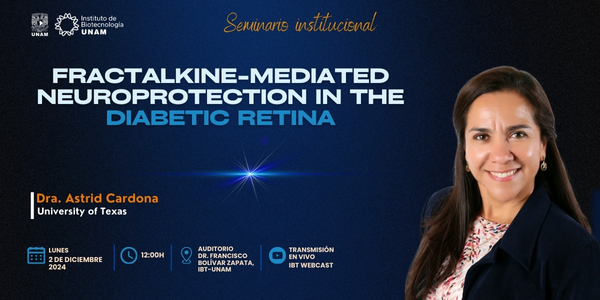
02Dic - 2024
Fractalkine-Mediated Neuroprotection in the Diabetic Retina
12:00 PM - 02:00 PM|Dra. Astrid Cardona|University of Texas|Invitado por: Dra. Leonor Pérez
Seminario
The Cardona lab focuses on inflammatory processes in the central nervous system (retina, brain, and spinal cord) and understanding the mechanisms of tissue damage in Diabetic retinopathy and demyelinating diseases. Her research is centered on the mechanisms that regulate microglia activation via signaling between the neuronal-derived chemokine fractalkine (FKN) and its receptor CX3CR1, which is highly expressed in resident microglia. As resident phagocytes, microglia are sensors of injury, acting as scavengers of damaged, injured, or targeted cells, synapses, and infectious agents. However, exaggerated microglial in response to injury can lead to bystander damage to neurons. Her studies have shown that FKN and CX3CR1 are highly abundant in the brain, spinal cord, and retina and directly inhibit the microglia’s inflammatory behavior. In humans, mutations in the CX3CR1 gene give rise to a defective receptor in its ability to bind the FKN. Therefore, understanding the role of the human versions of CX3CR1 is of clinical relevance for targeted clinical approaches. Specific areas of interest include:
- Clarifying the protective and detrimental roles of the innate immune system.
- Determining the origin of tissue injury and factors that account for disease progression.
- Testing neuroprotective therapies via modulation of innate immune cell function.
Actualizado 2024-11-25 23:05:38
16-Junio-2025 al 16-Junio-2025
12:00 PM
Dr. Daniel Alejandro Fernández Velasco
12:00 PM
Dr. Daniel Alejandro Fernández Velasco
Plegamiento y unión de ligandos en la proteína LAO



